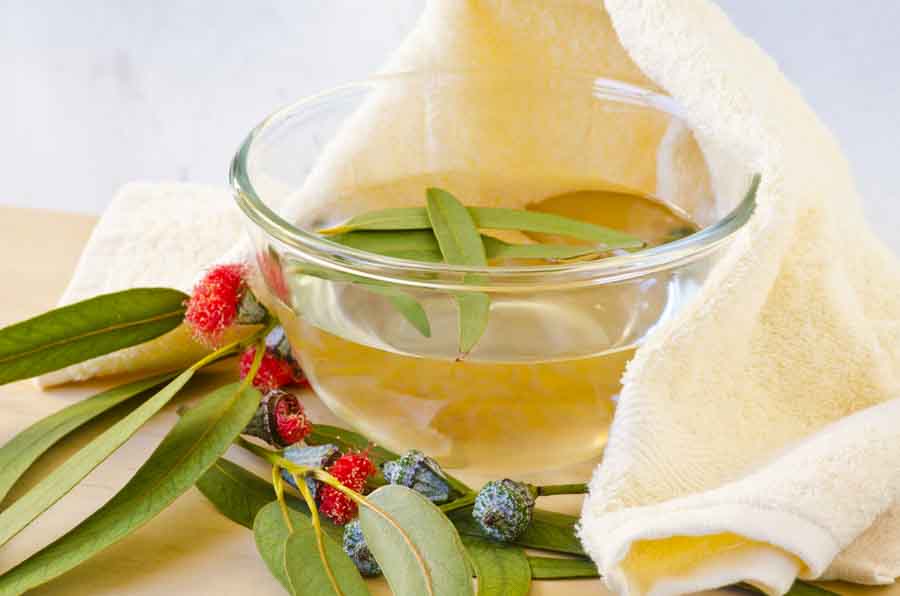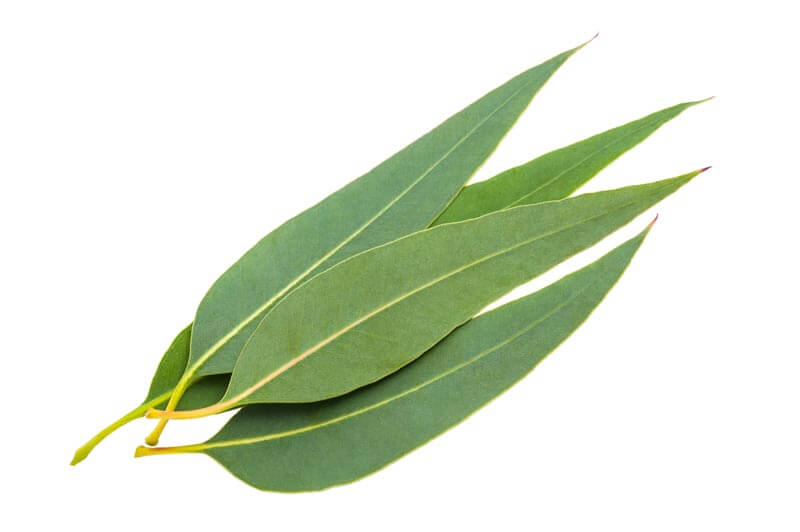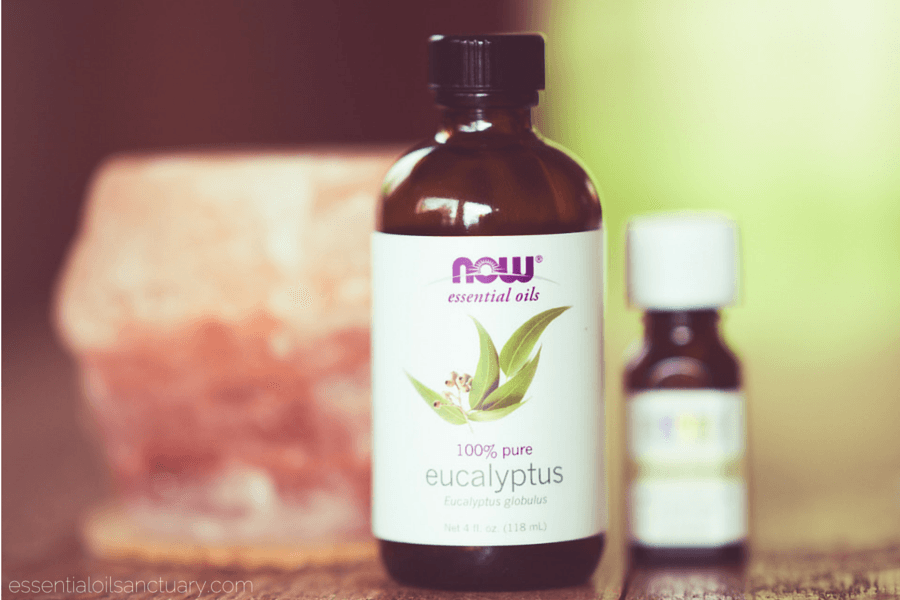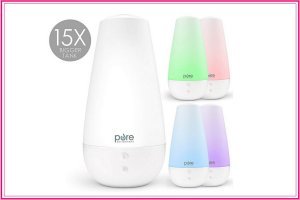
Eucalyptus oil has long been known for its many uses for health and the home. Widely used for medicinal and industrial purposes, it is known all over the world for its characteristic camphoraceous scent and refreshing property. Eucalyptus oil’s versatility and numerous benefits have made it one of the most sought-after essential oils for purposes ranging from treating minor health ailments to being used in home disinfecting.
Read on to learn more about eucalyptus oil and how you can apply its benefits to everyday well-being.
History & Origins of Eucalyptus Oil
Native to Australia and mainly noted as being the preferred food source of koala bears, the use of eucalyptus leaves by Australian Aborigines has been recorded. These people used the oil-containing leaves as a traditional medicine for a multitude of ailments such as fever, pain, wounds, infections, and respiratory illnesses.
Learning such uses from the Australian natives, a story has it that an early English settler used eucalyptus leaves to bandage his stitched thumb, which was nearly severed by an ax. A doctor who later treated the man was amazed at how well the wound had healed, and remarked at how there was no sign of infection whatsoever.
Such occurrences caused botanists, scientists and pharmacists to study the various species and parts of the eucalyptus tree in the late 1700’s, with an interest in the potential healing effects that its leaves contained. Many experiments yielded promising results, leading to the eventual extraction of the oil.
Its reputation spread in various countries such as Germany, England and the US. Soon after, eucalyptus oil was being used in hospitals and homes to treat respiratory ailments like bronchitis, coughs, asthma and flu. Its antiseptic properties also served well for treating skin ailments like wounds and burns, and for cleaning hospital apparatus like urinary catheters.
In Europe, the original eucalyptus oil introduced was extracted from the Eucalyptus peperita species, and was known as “Sydney peppermint.” It was remarked to be more effective than the more well-known peppermint oil at that time for respiratory ailments, as it was “less pungent and more aromatic,” and was able to relieve congestion more quickly.
Even scientists from China and India took to studying the oil. In Traditional Chinese Medicine, eucalyptus is an excellent remedy for promoting breathing and “clearing lung-phlegm.”
Eucalyptus takes its name from the Latin words “eu” meaning “well,” and “calypto” meaning “concealed or covered.” This refers to the flower of the eucalyptus tree, which is covered by a tiny cap before budding.
Today, eucalyptus trees can be found in many different countries for various purposes. Yet its main value lies in its essential oil, where simply rubbing two leaves together will give you that pungent, cooling aroma reminiscent of a refreshing gush of air.
Source and Composition of Eucalyptus Oil
Eucalyptus oil is extracted from the fresh or partially-dried leaves of the eucalyptus tree, also known as “blue gum tree” or “fever tree.” There are many species of eucalyptus, but this camphoraceous oil is obtained in particular from Eucalyptus globulus of the plant family Myrtaceae.
This colorless aromatic oil is obtained from the tree’s oval-shaped leaves using steam distillation. It contains over a hundred different compounds, including 1,8-cineole, pinene, limonene, and terpineol. Its main constituent is 1,8-cineole, also known as eucalyptol, and is responsible for most of the oil’s useful healing and antiseptic properties.
The tall, evergreen, eucalyptus tree was originally native to Australia, but today is grown all over the world for its valuable essential oil.
What are some Benefits of Eucalyptus oil?
Be it for treating skin problems, respiratory ailments or simply getting your home clean and fresh, a bottle of eucalyptus oil is a must-have. In aromatherapy, its cooling and cleansing properties have associated it as an herb of purification. This may be true, as eucalyptus oil’s antiseptic and disinfectant properties can kill off disease-causing microbes during infections and chase away nasty molds and germs from any surface in the home.
Eucalyptus oil’s wide range of beneficial effects is due to its active component, cineole, which has been studied extensively. Even now, its astounding potential in killing off leukemia cells is being further investigated.
It is commonly useful in congestion and relief of respiratory conditions, and can also help boost immunity and circulation.
Specific Benefits of Eucalyptus Oil

1.) It can help treat and heal scrapes and skin sores
Eucalyptus oil’s antiseptic properties can speed up the healing process of nasty scrapes, cuts, minor wounds, burns, boils and skin abrasions by fighting off germs and preventing the skin from getting infected. Its anti-inflammatory and analgesic properties also help ease the pain associated with such wounds. A few drops added into a healing salve or ointment can be placed over scrapes, cuts, and even on insect bites. For boils, a dilute solution of eucalyptus oil in a carrier oil can be rubbed or spritzed onto the affected area.
Related: 11 EOs for Healing Scars
2.) It keeps skin problems in check
Aside from treating minor cuts and scrapes, eucalyptus oil’s cooling effect can help remedy skin itching due to conditions like eczema, scabies, psoriasis and other skin irritations. It can also help prevent acne, skin eruptions and oily skin. You can either dab on a dilute blend of eucalyptus oil on the affected area, or you can also mix a few drops of oil with apple cider vinegar and apply on the problem area.
Related: 10 EOs for Itching / Pruritis
3.) It helps in relieving cough and colds
A nasty cough and cold can easily be soothed by eucalyptus oil’s cool, menthol-y scent, which is the trademark scent in a lot of vapor-rub formulations. This is because of the oil’s expectorant properties, whereby it loosens up mucus and phlegm for you to more easily cough up or expel. The best ways to use the oil for this purpose are as a rub on the chest or breathing in the oil using a diffuser. You can also rub a few drops between your palms and cup your hands over your nose for easy inhalation. Alternatively, a steam inhalation session containing eucalyptus oil also makes for an effective remedy. Simply pour a cup or two of boiling water onto a bowl or small wash basin. Mix in 10-12 drops of eucalyptus oil, and inhale the vapors deeply with a towel draped over your head. When doing this, be sure to keep your eyes closed as the oil’s cooling effect can make your eyes sting a bit.
Related: 5 EO Remedies for Coughs
4.) It alleviates asthma and congestion
A variety of studies have looked into eucalyptus oil’s effectiveness for asthma relief. Since asthma occurs due to inflammation of the airways, the oil’s anti-inflammatory properties coupled with expectorant and decongestant effects have been shown to help patients breathe more easily. Eucalyptus oil also helps clear out chest and nasal congestion experienced from a variety of respiratory ailments. You can use the same methods above for using eucalyptus oil to treat asthma. A side note when using this oil for treating asthma is to first check with your physician before doing so, as some anti-asthma medications do not interact well with eucalyptus oil. Also, this oil is not meant to take the place of anti-asthma medications that your doctor may have prescribed for asthma attacks.
Related: How to Safely & Effectively Inhale EOs
5.) It can be used to support treatment for various respiratory infections
In addition to relieving congestion, cough and colds, eucalyptus oil can also be used to treat respiratory infections. Its antibacterial action can help combat disease-causing bacteria found in conditions like bronchitis, pneumonia, and even tuberculosis, along with other respiratory conditions. Inhaling the oil via steam inhalation or rubbing it on the chest can help with the symptoms that come with such infections. Again, take note that the oil is only a support therapy for such infections, and cannot take the place of antibiotics or other prescription drugs that your doctor may have given.
Related: 5 EO Remedies for Sinus Infection / Sinusitis
6.) It provides pain relief for aching joints and muscles
Coming home for the day with tired muscles and joints means that a eucalyptus oil massage is in order. The oil’s energizing scent plus its analgesic and anti-inflammatory actions are ideal for relieving the pain in sore body areas. It can also be used for a variety of ailments like rheumatism, sprained ligaments, tendon pain, neuralgias and fibrosis. Simply massage a dilute blend of eucalyptus oil onto the affected areas in circular, soothing strokes.
Related: 9 EOs for Sore Muscles / Muscle Pain
7.) It can help treat shingles
Shingles comes with very painful blisters that tingle, itch and burn until they have healed. Eucalyptus oil’s cooling and pain-relieving abilities can help deal with the discomfort associated with this condition. Additionally, its anti-inflammatory and immune-boosting properties can help soothe and speed up healing. To use eucalyptus oil for shingles, mix 20 drops of eucalyptus oil in a cup of warm water. Dip a soft washcloth in the mixture, squeeze out excess water, and place on the affected area as a warm compress. Repeat dipping and applying as necessary. If the blisters occur in a larger area, you can also add in about 20 drops of eucalyptus oil to a warm bath to help soothe the pain.
8.) It works for sinusitis and allergy relief
Swelling and blockage of the sinuses due to bacterial infection can be quite bothersome. Eucalyptus oil, with its potent decongestant properties, can bring relief and help allay the annoying inflammation and pain. Additionally, its antibacterial effects can also assist in busting the bacteria responsible for the infection. Studies on eucalyptus oil have found that patients had a much quicker improvement from sinusitis and allergies when they used the oil to supplement their treatments. It also lessens the severity of seasonal allergies that affect the respiratory system. You can apply eucalyptus oil diluted in a carrier topically near the nostrils, inhale a few drops rubbed between your palms, or better yet, add it to a bowl of hot water for steam inhalation.
Related: 9 EOs for Allergies
9.) It eases a sore throat
A scratchy, sore throat can come with swelling and difficulty in swallowing. With its anti-inflammatory and analgesic properties, eucalyptus oil can make the symptoms more manageable. Aside from this, many cases of sore throat can be due to a bacterial or viral infection, making eucalyptus oil quite useful in killing off those nasty germs causing the infection. To ease the pain and swelling of a sore throat, check out our recipe below on making your own “Eucalyptus soothing sore throat spray.”
Related: 8 EO Remedies for a Sore Throat
10.) It’s a great immune system booster
Aside from fighting off infection and inflammation, eucalyptus oil can also boost the immune system by stimulating the cells in the body that support immunity. This makes it quite handy when flu season comes around, or in instances when you know you’re going to be exposed to crowds and have higher chances of catching a bug. Load the oil into a diffuser or use a personal inhaler to obtain the immune-boosting benefits of eucalyptus oil.
11.) It combats tension and mental exhaustion
Eucalyptus oil’s cooling and refreshing effect makes it an ideal for that mental pick-me-up when you feel mind fatigue and sluggishness setting in. Its ability to promote blood flow helps increase circulation to various body areas, including the brain. It is also able to ease tension and stress, providing a invigorating scent that helps aid in rejuvenation and alertness. Rub a few drops of the diluted oil on your temples or inhale via a diffuser to keep mental fog and stress at bay.
Related: 14 EOs for Energy & Wakefulness
12.) It can be used for oral hygiene maintenance
Eucalyptus oil’s minty, camphoraceous scent makes it an ideal addition to mouthwashes and other oral hygiene products. Its antiseptic activity helps fight off dental problems like gingivitis, bad breath and even plaque buildup. Add a few drops to a mouthwash recipe and you’re good to go!
Related: EO Based DIY Mouthwash Recipes
13.) It can be used for itchy scalp relief
By virtue of its ability to neutralize skin problems, eucalyptus oil helps heal an itchy scalp caused by dandruff or excessive oiliness. Its cooling effect is also ideal in soothing any annoying itchiness. Eucalyptus oil provides nourishment to hair and gives a clean, cool scent. You can use it on your hair and scalp as a hair rinse using our recipe below, or mix it with coconut oil for a moisturizing hair mask.
14.) It removes nasty odors from the home
Nasty, smelly odors can often pop up here and there, and many of us are faced with bothersome, sometimes repulsive, odors around the home. Be it a stinky pet bed, a teenager’s shoes, or a curiously smelly carpet, eucalyptus oil can help ward away bad odors. Place a few drops of the oil in water and mix, then, using a rag soaked in the mixture, wash or wipe the offensive object. Then, dry outside, preferably under the sun. You can also make an odor-removing spray using our recipe below, and use it on walls and other areas to eliminate odors from smoke, the trash bin or the toilet.
15.) It’s a great insect repellent
Mosquitoes and other bugs detest the scent of eucalyptus oil, making it an ideal insect repellent. Simply add a few drops to your bug spray mixture, or make your own homemade bug repellent spray. You can also combine it with other oils and spray near windows or use as a topical repellent.
Related: 7 EOs for Bee Stings, Bug Bites
16.) It effectively works as a natural home cleaner
For many people, chemical cleaners may seem too strong and irritating, especially if you are sensitive to harsh odors or if you have kids and pets in the home. A great alternative to such cleaners is using a mixture of eucalyptus oil with vinegar, hot water, and dish washing detergent. Use this solution for cleaning your floors, toilet, windows, sink, and pretty much any surface around your home. Eucalyptus oil gives a clean, refreshing scent, while also infusing disinfectant properties into the solution and preventing any mold growth. Check out our recipe for a “Eucalyptus oil all-around cleaning solution” below!
17.) It can be used to deter pests
Ants, cockroaches, moths and other insect pests can be frequently found in cupboards and drawers. Wipe or spray eucalyptus oil onto cupboard walls, drawer liners or other storage areas to deter these tiny nasties. You can also place a drop or two on a padded coat hanger to keep cockroaches and moths away from your closets, or place a few drops on a cotton ball and place in pest-prone corners. A plus is that it gives a fresh, clean scent to your storage areas.
18.) It works for flea control
If your dog is a walking fleabag but you don’t want to use any of those flea collars or flea powders with harsh chemicals, eucalyptus oil is the answer! The oil is safe for dogs and can safely be added to pet shampoo. Place 3-4 drops on your shampoo mixture and bath your dog the usual way. You can also make an organic flea collar. Get a bandana or a similar piece of cloth, and place 8-10 drops of eucalyptus oil on various spots in the bandana. Fold into a triangle and tie onto your dog’s neck. Voila, you now have a happy, pest-free pet! Note that you may have to replenish the bandana with a few drops of the oil every few days as the oil evaporates into the air over time.
19.) It works like magic as a spot remover
Be it spots on your carpet, clothes, sofa, or other fabrics, eucalyptus oil works as an effective stain remover. Simply mix a small amount of liquid washing detergent with a few drops of eucalyptus oil to make a paste, then dab onto the stubborn stain. Leave this on for about ten minutes, then wash as usual or wipe off the mixture with a wet washcloth if you’re treating larger materials like a carpet or couch. Before trying it on the stain though, be sure to test it first in an unnoticeable area on the item to check that the oil doesn’t react strangely to the fabric you intend to treat. Eucalyptus oil also removes most sticky material that has stuck to fabric like gum, wax and sticky tape. It also helps dissolve heavy oil stains on clothing.
20.) It can be used on head lice
Eucalyptus oil is a great alternative to chemical lice treatments, and can help keep a lice problem at bay. If it works for fleas, then it can be useful for a headful of lice as well. As an all-natural treatment for lice, place several drops of eucalyptus oil diluted with a carrier on hair and scalp. Comb the oil through the hair for a few minutes and leave on. You can repeat this procedure throughout the day, and rinse off the oil after a few applications. You can also opt to leave the oil on the hair overnight and rinse it off the next day.
21.) It can be used to help cool a fever
Eucalyptus oil’s cooling effect can help reduce the discomfort and heat that a fever brings. This is probably one of the reasons why eucalyptus oil is also named “fever tree oil.” Spritzing a few drops on your body can help your temperature cool down a bit. It’s also great as a cooling spray when you simply want a relief from hot weather. Try making our “Eucalyptus-peppermint cooling spray” recipe below for a freshly-scented temperature reducer.
Things to keep in mind when using eucalyptus oil
Eucalyptus oil is generally safe to use, but as with all essential oils, precautions need to be taken to prevent any adverse reactions. The oil should not be taken by mouth except under the supervision of a physician. When used topically on the skin, eucalyptus oil is safe to use. Avoid using the oil or any eucalyptus salve or chest rub on the face and nose for children under the age of two. For babies and small children, its best to avoid using the oil, but if necessary, use only half the adult dose in preparations intended for a child. If you are pregnant, breastfeeding, have hypertension or epilepsy, it’s best to avoid using the oil. If you have any other conditions and are not sure whether it’s safe to use the oil, ask your doctor about this.
If you have sensitive skin, it’s best to do a skin patch test first to check if you are allergic to the oil. When applying directly on the skin, make sure that the oil has been diluted properly with a carrier oil to prevent any burning or stinging. Excessive use of the oil my cause toxic effects on both adults and children. In all cases, avoid getting eucalyptus oil or its vapor in contact with the eyes, lips, and mucous membranes.
Eucalyptus oil is highly flammable, so be sure to keep it away from excessive heat and open flames like stoves and fireplaces. Make sure that it is stored in an area that children and pets cannot access.
Eucalyptus oil can be mixed with other oils. It blends well with many essential oils such as lavender, thyme, cedarwood, rosemary, lemongrass, pine, frankincense and lemon.
Eucalyptus Oil Application Tips, Tricks and Recipes

The versatility of eucalyptus oil for well-being and for a clean home makes it a must-have on your list of household supplies. Here are a number of ways and tips you can put this invigorating, disinfecting oil to good use.
- For a refreshing foot soak at the end of the day, add five drops of eucalyptus oil to a basin of warm water and soak those sore, tired peepers. You’ll get to enjoy revitalized, tingling toes afterward!
- To freshen up the bathroom while showering, place 3-5 drops on a corner that isn’t easily accessed by water. You’ll walk out of the bathroom feeling invigorated and stress-free!
- Freshen up any area around the house by putting a cotton ball with a few drops of eucalyptus oil in various corners.
- When in the sauna, add two drops of the oil to a cup of water. Pour over the hot rocks and breathe in the revitalizing aroma.
- If you don’t have a diffuser and have a humidifier instead, use about five drops of oil in your humidifier to allay asthma, nasal congestion, cough and throat infections.
- Smelling the stink from your trash bin? Place a few drops of eucalyptus oil into the trash bin to banish the unwanted smell.
- Freshen up your laundry by adding about a teaspoonful or two of eucalyptus oil for every load. It also helps disinfect dirty clothes, towels and other dirty laundry.
- Add eucalyptus oil into your home cleaning products. Be it your window cleaner, toilet cleaner, or mop water, you can’t go wrong with its clean scent and antimicrobial properties.
- If your hanging car freshener seems to have reached the end of its life span, add a few drops of eucalyptus oil and it will smell good as new!
- Freshen up and sanitize your vacuum and clothes dryer filters by adding a few drops of eucalyptus oil.
- To make an antimicrobial soap, mix in a few drops of eucalyptus oil with Castile soap. Use this for your hands, body, pets, and even for cleaning!
1.) Eucalyptus soothing sore throat spray
Ingredients:
- 3/4 cup filtered or purified water
- 2 tablespoons raw, organic apple cider vinegar
- 1 tablespoon sea salt
- 1 tablespoon raw, organic honey
- 3 drops eucalyptus oil
- 3 drops clove oil
- 3 drops peppermint oil
- 8 drops lemon oil
- Spray bottle
Instructions:
Mix the sea salt and honey with water and stir until fully dissolved. Then, mix in the apple cider vinegar and the essential oils. Pour into a clean, dry spray bottle. You can store this soothing throat spray in the fridge, where it can keep for up to six months.
To use this throat spray, shake the bottle first, then spray twice at the back of the throat. The anti-inflammatory and analgesic effect of the oils can help soothe the scratchiness and pain, while their antimicrobial effect also promotes healing from the infection along with the apple cider vinegar and sea salt. Note that this throat spray may not taste fantastic, but it sure is an effective way to combat a sore, itchy throat. It also gives a cooling sensation that makes your throat feel better.
2.) Eucalyptus-lemon cough drops
Ingredients:
- 1 cup raw, organic honey
- 3 drops eucalyptus oil
- 7 drops lemon oil
- 11 drops Shield essential oil blend
*You’ll also need a candy thermometer and some plastic or silicone molds to shape your candies
Instructions:
Over medium heat, place the honey into a small or medium-sized saucepan. When the honey comes to a boil, lower the heat and continue cooking while stirring occasionally until the honey reaches the “hard crack” indicator on your candy thermometer. This temperature would be about 295 to 309 degrees Fahrenheit. Remove from heat and let the honey cool for about two minutes. Add in the essential oils and mix well, making sure that the oils are distributed evenly throughout the honey.
Grease the candy molds, and pour the mixture onto them until each mold is full. Cool the candies in the fridge until they have completely hardened. Remove from molds.
You can now wrap each piece of candy in parchment paper to prevent them from sticking together. Store the candies in a covered, airtight container to keep them from getting moist. Place in the fridge or somewhere with a cool temperature. You and your family can now use them as needed to ease sore throats and nasty coughs.
3.) Anti-itch eucalyptus hair rinse
Ingredients:
- 3 tablespoons apple cider vinegar
- 30 drops eucalyptus oil
- 4-5 cups water
Instructions:
- Warm the water over your stove for a while, making sure that the temperature is not too hot to prevent evaporation of the oil. Then, add in the eucalyptus oil and apple cider vinegar. Mix well.
- To use this hair rinse, shampoo as usual and rinse out. Then, get an appropriate amount of the eucalyptus hair rinse and pour over your scalp, concentrating on the areas that feel dry and itchy. Leave on the hair rinse for about five minutes, then thoroughly rinse it out.
- The apple cider vinegar helps cleanse your scalp, while the eucalyptus oil offers relief from itching and dandruff and gives your scalp that revitalized sensation.
4.) Eucalyptus odor-removing home spray
Ingredients:
- 1/2 cup white vinegar
- 20-30 drops eucalyptus oil
- 2 tablespoons baking soda
- 2-4 cups water
- Spray bottle
Instructions:
In your spray bottle, mix together the baking soda and the white vinegar. Add in the eucalyptus oil, then put in several cups of water depending on the capacity of your spray bottle. Make sure to leave a little air space in the bottle for adequate mixing. Shake well to combine contents, then allow the sediments to settle. You can now spray it onto smelly surfaces or stinky corners of the house! Remember to test on an inconspicuous area if you intend to use it on clothes or fabrics to make sure it doesn’t react badly to the color.
5.) Eucalyptus all-around cleaning solution
Ingredients:
- 1/2 cup white vinegar
- 1 cup hot water
- 1/8 tablespoon liquid dish detergent
- 10 drops eucalyptus oil
- Spray bottle
Instructions:
In your spray bottle, mix together the vinegar and the hot water. Add the liquid dish detergent, and cool the solution until just aout warm. Add in the eucalyptus oil and shake well to mix. You can now use this on various surfaces around the home to clean out grease, molds, slime and dirt.
6.) Eucalyptus-peppermint cooling spray
Ingredients:
- 1/4 cup witch hazel (non-alcoholic)
- 1/4 cup aloe vera gel
- 3 drops peppermint oil
- 3 drops eucalyptus oil
- Small spray bottle, preferably glass
Instructions:
In your glass spray bottle, mix together the witch hazel and aloe vera gel. When blended together, add in the essential oils. Mix well or shake until all components are combined. Spritz onto yourself whenever needed to help cool a fever, have relief from a hot summer day, or even to soothe the sting of sunburns and insect bites.
7.) Eucalyptus laundry detergent
Ingredients:
- 3/4 cup baking soda
- 1 cup liquid Castile soap
- 2 1/4 cups warm water (and more as needed)
- 1/4 cup finely grated sea salt
- 1 tablespoon eucalyptus oil (or more as desired)
Instructions:
- In a container, dissolve the baking soda and salt in warm water.
- Once dissolved, add in the Castile soap and eucalyptus oil. Stir well.
- Place in a gallon container and add in more water to the container, leaving some air space for shaking.
- Cover the container and shake to mix.
- Use this freshly-scented detergent for clean smelling laundry and as an antimicrobial for dirt and germs.
Conclusion

We hope that this article helped you learn about how you can use eucalyptus oil in many aspects of your day-to-day living! Any other suggestions and recommendations are welcome in the comment section below.










